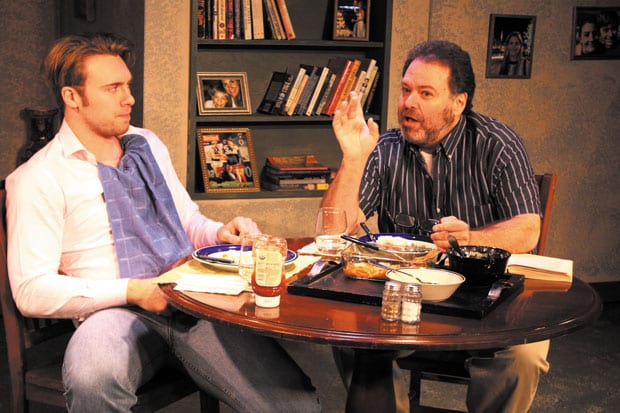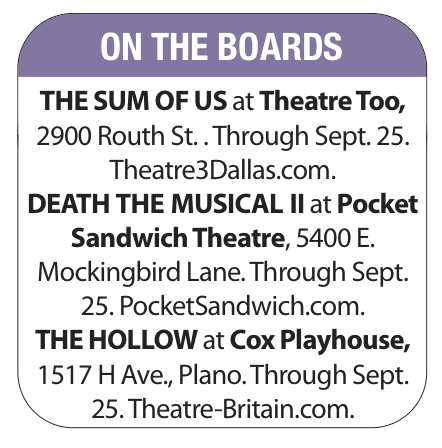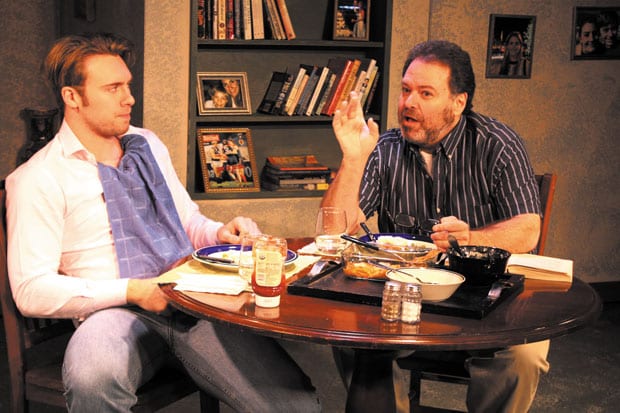‘Death’ is something to sing about (again); Agatha takes us deep into ‘The Hollow;’and going Down Under at Theatre Too with ‘The Sum of Us’

A gay son (Blake Lee) and his intrusive dad (Randy Pearlman) manage co-habitating in the comedy-drama ‘The Sum of Us.’ (Photo courtesy Linda Harrison)
ARNOLD WAYNE JONES | Executive Editor
 Scott A. Eckert is certainly one of North Texas’ most peripatetic theater practitioners. He’s often seen (or more likely, heard) onstage as a musical director and keyboardist, though has been known to act and even serve as playwright, composer and director. He tackles those last three chores in his new original musical Death The Musical II: Death Takes a Harmony. A loose follow-up (natch) to Death The Musical, it’s a homespun shaggy dog mystery set in the wilds of BFE, Oklahoma. Into this sleep redneck berg pops Detective Inspector Harman (Chuck E. Moore), a British policeman ostensibly on vacation but actually investigating a series of seemingly unrelated “accidental” deaths by the residents. Most of the victims are gun-wielding good ol’ boys who shoot firecrackers off their heads and negligently pole-dance themselves to an early grave. Is it Darwinism at work, or something more insidious?
Scott A. Eckert is certainly one of North Texas’ most peripatetic theater practitioners. He’s often seen (or more likely, heard) onstage as a musical director and keyboardist, though has been known to act and even serve as playwright, composer and director. He tackles those last three chores in his new original musical Death The Musical II: Death Takes a Harmony. A loose follow-up (natch) to Death The Musical, it’s a homespun shaggy dog mystery set in the wilds of BFE, Oklahoma. Into this sleep redneck berg pops Detective Inspector Harman (Chuck E. Moore), a British policeman ostensibly on vacation but actually investigating a series of seemingly unrelated “accidental” deaths by the residents. Most of the victims are gun-wielding good ol’ boys who shoot firecrackers off their heads and negligently pole-dance themselves to an early grave. Is it Darwinism at work, or something more insidious?Death II, presented at dinner-theater staple Pocket Sandwich Theatre, maintains the venue’s reputation for audience-friendly light entertainment, but Eckert’s smarts and wit bleed through all the camp. There are droll references to Shakespeare, hilarious asides (stingingly delivered by the wonderfully deadpan Moore) and gentle digs at Okie sumbitches. (One gay redneck, for instance, doesn’t even know he’s gay until his boyfriend explains it to him.) As a director, there are dead spots — slow scene transitions, flat stagings), but what holds the show together is Eckert’s score. From the complex lyrics to the beautiful music (the ballad “The Story of My Life” is hands-down brilliant songwriting), Death II is a jaunty meta-mystery — comic, campy and accomplished.
Up in Plano, another three-act mystery is playing out in more a more conventional setting. Agatha Christie’s The Hollow is set in the drawing room of a remote English manor, where half a dozen relatives and a few guests have gathered for a weekend of hunting, tea… and murder! It’s delicious melodrama, as only Christie can construct. Everyone’s a suspect as the inbred Angkatells connive and reveal dark secrets, all of which could justify why someone shot an obnoxious dead on the patio. (We see the murder, and still don’t know whodunit.)
This is Theatre Britain’s third production of a Christie classic in as many years, and being lessen known that And Then There Were None and The Mousetrap, it’s likely to keep more watchers guessing, although the denouement is also less satisfying than those others. Still, there are some performances to relish in this staging, including Cindy Beall as the absent-minded (but more-devious-than-she-looks) hostess; Byron Holder as the elegantly savvy detective; Natalie Johnson, swooshing through her scenes as the glamorous starlet Veronica Craye; and Walt Threlkeld, whose spot-on accent as Gudgeon makes you wonder if the butler did it.
The accents are more Down Under than Downton in The Sum of Us, an Aussie play now at Theatre Too. It’s the 1990s, and Harry (Randy Pearlman) is a generously accepting dad of a gay 24-year-old son, Jeff (Blake Lee). But having your live-in dad OK with your sexual orientation is as much blessing as curse for Jeff, who has to endure having his make-out sessions with new beau Greg (Michael Brannian) interrupted by Pops. Parents are embarrassments to the children, even when the children aren’t embarrassments to their parents.
The Sum of Us is an uneven and occasionally frustrating play. What was edgy for 1990 feels a little more dated now, though neither does it play out like period piece. What’s most confounding is its structure: Harry and Jeff alternately serve as narrators, with long, rambling soliloquies that sometimes bring the action to a screeching halt just as the momentum has built up. That’s especially true in the often outrageously funny (and frequently sexy) comic scenes. But the playwright, David Stevens, can’t decide if he’s written a comedy, a dramedy, a melodrama or an outright tragedy, and the pieces fit awkwardly together.
That’s no fault of the cast, who are uniformly excellent. Lee has a bravura openness in his stage persona, bigger than life and windblown in its unpredictability. Pearlman rides the crests of the play expertly. Brannian, in his professional stage debut, nails the accent and the discomfort of the still-closeted Greg. Mark C. Guerra makes smart use of the downstairs black box, but even he can’t help the stifling heat that pervades a two-and-a-half hour play sans air conditioning. Authenticity is welcome in theater, but they did not need to recreate the Outback in a basement.
This article appeared in the Dallas Voice print edition September 9, 2016.


